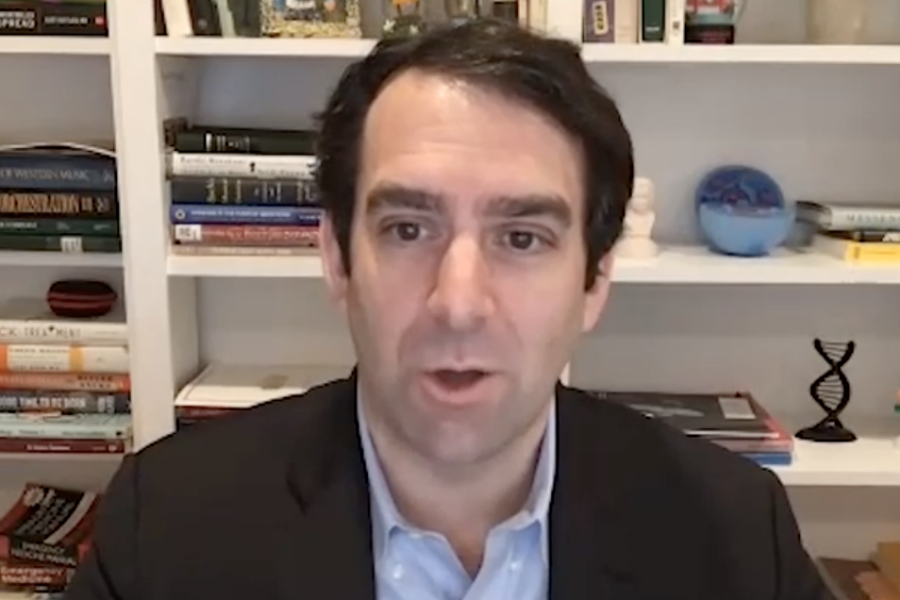MedPageToday Diabetes drug found to reduce chance of long COVID in clinical trial preprint. Hi, it’s Jeremy Faust with MedPage Today. Thanks for joining me. Today, we’re going to discuss an interesting new paper called “Outpatient Treatment of COVID-19 and the Development of Long COVID Over 10 Months.”
Link to related paper in The Lancet (Preprint)
This is a randomized trial that actually found that patients who are randomized to get metformin, the diabetes drug, actually had lower rates of long COVID diagnoses than patients who had received placebo.
This is a major finding, because we now have a way to possibly decrease long COVID.
Let’s back up and talk about this paper, because I think it’s pretty important. Let’s start just with the concept — it’s part of the COVID-OUT studyopens in a new tab or window, which is a decentralized multi-site trial in the United States. The researchers gave patients either metformin, ivermectin, fluvoxamine, or placebo, and they were allocated randomly in a 1:1:1:1 way.
[Patients] were actually enrolled in this study right when they got COVID, within a few days of symptoms or a documented infection. Long COVID was defined as whether or not a patient received the diagnosis from their healthcare providers rather than a specific set of criteria, because right now long COVID is difficult to define, so it’s reasonable just to let the doctors and other providers on the ground make that determination. Let’s talk through what happened here.
The patients were middle-aged, 45-years-old was the average. The median body mass index was 30, so these were overweight patients. The patients received the drug or placebo generally within just a few days of their onset of disease.
The primary result, that is the cumulative incidence of developing long COVID, was 10.6% among patients who had gotten placebo and 6.3% among patients who got metformin. That is a large decrease — over a 4% absolute decrease in long COVID and a 42% relative reduction. That’s a massive, massive finding in a disease like this.
This study happened at a time when a little over half of the patients had been vaccinated for COVID. Very few had been boosted at that point, so we don’t have a lot of information there.
If you look at the curve, the Kaplan-Meier curve, showing the placebo versus the metformin incidence of long COVID, looking at how diagnoses cropped up over time, we see what we’re always looking for in a Kaplan-Meier curve, which is that those curves do split. They really are not on top of each other. There is a real difference, and it’s a statistical difference that we see between patients who had placebo versus metformin.
A couple things to note here. First of all, it’s a little alarming that people are getting a long COVID diagnosis, some as early as 30 or 60 days out. In my view, this is a pandemic disease. People who have symptoms for 30 days, I think that’s to be expected. Maybe as you head towards 60 and 90 days, you’re looking at a subacute or more chronic process. But certainly 10% to 20% of patients in the placebo arm, for example, got their diagnosis of long COVID just within 60 days, so we don’t know exactly how accurate these diagnoses are, but we do know there is a difference.
We do know that metformin made a huge difference. In fact, as you got later and later in the study, the difference in the risk reduction that metformin seems to have conferred actually became more impressive. So by day 180, by day 240, by day 300, we’re talking about 3.8% to 4.3% absolute risk reduction, getting bigger over time, and then things sort of stabilize, which I think is a really important sign that this was a real effect that was measured.
Let’s talk about some other features of this study looking at forest plots. In the study, we see that there are some things where metformin seems to have been favored. For example, for females, metformin performed a bit better. For people with a body mass index above 30, metformin does a bit better. It looks like people who got metformin earlier, under 4 days [from diagnosis], did a bit better. Younger people did a bit better. Also, interestingly enough, people who were not vaccinated did better, which is another interesting observation, meaning that people who were vaccinated had protection.
Of note, this study did find, although it’s not designed to study this question per se, this study did find that vaccination had a much lower association with long COVID. In other words, if you were vaccinated, you were about half as likely to have long COVID to begin with. This is another key finding.
But I think what is so key here is that this study showed that long COVID is a modifiable disease, and that actually is profound. I’m not sure that we’ve really ever seen that before, because we’ve never seen that you could do something to prevent the disease. If a disease is not treatable or too amorphous to be even understood well enough to treat, we can’t see a separation in a randomized controlled trial.
This trial actually does something far more profound, in my view, than just show that metformin decreases long COVID. It actually shows that we understand something about this process enough that actually we can measure it and we can modify it. That to me is actually a major, major finding.
